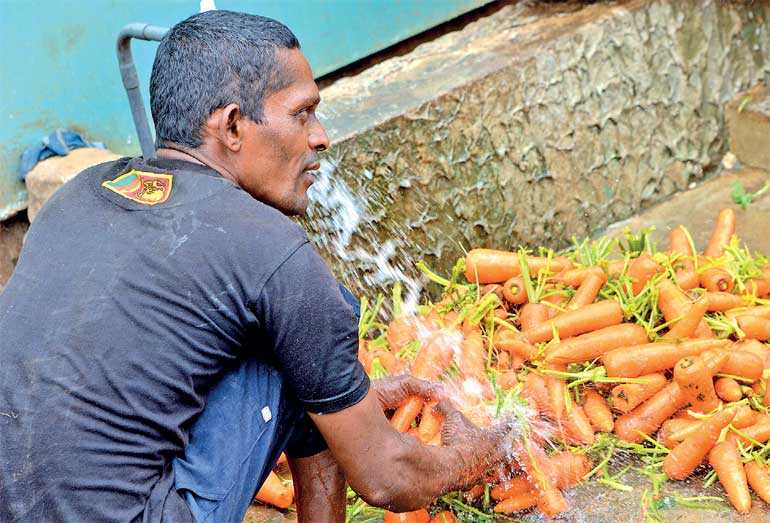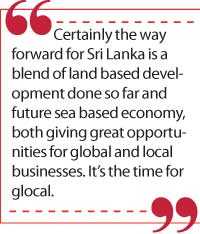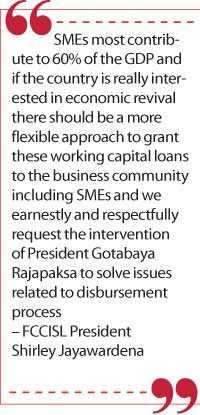Friday Feb 27, 2026
Friday Feb 27, 2026
Monday, 8 June 2020 03:52 - - {{hitsCtrl.values.hits}}

When purchasing decision is made, government agencies are encouraged to give priority to affected small and medium-sized enterprises and their products and services – Pic by Shehan Gunasekara
The Federation of Chambers of Commerce and Industry (FCCISL), the country’s most representative private sector lobby group, yesterday issued the following statement highlighting concerns over the delay in the disbursement of working capital loans and outlining suggestions for a rapid recovery of the economy post-COVID-19 pandemic.
FCCISL wishes to sincerely thank the government for granting the working capital loans for affected businesses but observes that the process is too slow and needs a faster approval mechanism for the dying businesses. FCCISL is also deeply concerned about the methodology adopted by various banks engaged in the process of disbursing the working capital loans to the business community under the relief package granted by Central Bank in March 2020.
 |
 |
 |
We have received many complaints from our membership, which is scattered under 8 national chambers, 19 business associations and 30 regional chambers all over the island over rejection of their applications citing reasons such as need for collateral, proof of business, requesting loans first time, construction industry is not considered, service sector is not entitled, facility cannot be granted if the existing loans enjoy the moratorium etc., etc. These business entities are mostly coming under the SMEs affected due to COVID-19 for which the government wanted to provide funds at a concessionary rate of interest (4%) to help revive the businesses.
Speaking on behalf of Matara District Chamber of Commerce, its President Meththananda Vidanagamachi expressed his disappointment over the rate of rejection by commercial banks citing various reasons. On enquiry he said so far less than 10% of his members have obtained the working capital loans. Several member chambers of FCCISL have told us that some members have been granted working capital loans but only to recover banks’ own dues such as overdrafts granted prior to COVID-19, making the objective of the government meaningless.
FCCISL’s member chambers such as chamber of tourism industry, Trincomalee and Batticaloa district chambers too expressed their disappointment over the treatment received by their members from financial institutions located in their areas. If 20% of our membership can get this working capital, loan facility that will be a great achievement chamber leaders further commented. Speaking on behalf of FCCISL on reimbursement of loans the current president Shirley Jayawardena said SMEs most contribute to 60% of the GDP and if the country is really interested in economic revival there should be a more flexible approach to grant these working capital loans to the business community including SMEs and we earnestly and respectfully request the intervention of President Gotabaya Rajapaksa to solve issues related to disbursement process.
FCCISL also envisages that the total package of Rs. 50 billion is far less than the industry needs and in a situation where all MSMEs face near bankruptcy, at least Rs. 350 billion is needed to revive these businesses. At the time of starting the COVID-19 crisis, various government agencies alone owed Rs. 140 billion to the construction industry.
Therefore, FCCISL very sincerely requests the government of Sri Lanka to increase the relief package from Rs. 50 billion to Rs. 350 billion. Taking in to consideration the gravity of the situation and as a matter of national priority and urgency, FCCISL wishes to suggest to the government to implement following measures immediately to ease the crisis faced by SMEs and MSMEs:
(a) Government needs to strengthen the state procurement support and timely payment for procurements for key areas of the economy that include health, food, construction, transport, IT, etc.
(b) When purchasing decision is made, government agencies are encouraged to give priority to affected small and medium-sized enterprises and their products and services.
(c) Government agencies, for any reason, should not delay the payment to small and medium-sized enterprises.
(d) Government can encourage the relevant training and related institutions to promote information and communication technology among SMEs and the respective trade chamber bodies may be channelled for the implementation.
(e) The President has recently advised the CEOs of the banks to support small and micro enterprises who come up with new innovative product ideas or engaged in manufacturing import substitutes or improve value addition but unable to offer any security. Therefore, FCCISL wishes to propose to set up a guarantee fund to enable banks to support such business start-ups.
(f) FCCISL also appeals to the government to set up a special rescue fund to support the tourism industry by providing a grant to SMEs in the tourist industry for one year. FCCISL has studied the bankers are not extending any facilities since they are not sure about the time of revival this sector as it is.
Need to implement radical revisions to the country’s incentive structure for industries which includes fiscal and tax policies to bring back the entrepreneurs to make investments to ensure kick-start of the economy.
On the short term FCCISL wishes to propose the following measures for implementation:
(a) Granting tax amnesty for cash and cash equivalents for six months with a view to strengthen the cash flow in the banking system,
(b) Further extension of amnesty granted to foreign remittances, and foreigners who invest in Sri Lanka over $ 500,000 to grant up to 8 years. (b-1) Special tax concessions can be considered to these investors for the investments related to the agriculture/food security and who are investing to support the National Export Strategy.
(c) The major barriers which prevent more exports from Sri Lanka to the world is high production cost and lack of productivity in many industries (the average interest rates of Sri Lankan banks and the energy cost in the region is very high and this affects production cost and also the pricing for exports and export prospects). In this context as a tactical move it is recommended to grant subsidies to Sri Lankan exports and export prospects for a period of two years followed by a major productivity drive across all major industries to offset inefficiencies of production processes making Sri Lankan products more competitive in overseas markets (on successful completion of the productivity drive the export subsidy can be later withdrawn).
(d) To introduce a special loan scheme to promote sectors identified by national export strategy (e.g. tea, rubber gem and jewellery, spices, wellness spa , electrical, electronic, IT-related products, assembling of vehicles and boat and shipbuilding and other important domestic sectors such as health, dairy farming, agriculture, fishing, transport, etc.
(e) In order to support SMEs, the banking system should introduce a loan scheme at least up to Rs. 2 million without sound collateral from those who cannot provide acceptable tangible securities. The total amount of such loan, in order to protect the banking system may have a cap of the total loan outstanding of the bank, etc.
(f) In order to improve capital market the dividend income from listed companies should be exempted from income tax for at least three years.
(g) Government needs to allow at least six months moratorium on the payment of EPF/ETF of SMEs with the consent of employees so that the disposable income of both will be injected to the economy to improve cash circulation.
(h) To establish loan risk compensation funds and make appropriate compensation to financial institutions for the non-performing loans issued to small and micro businesses.
(i) We encourage government to issue small and micro financial bonds and construction bonds to collect funds needed to finance SME and construction industry.
(j) To allow bringing foreign skilled workers focus for selected sectors such as mechanical, electrical and electronic to work in free trade zones for 1-2 years.
(k) Providing free lands without rent fee for 10 years for cultivation and agro business purpose backed by sound business proposals, etc.
(l) To extend the time limit for recovery of businesses sector wise and according to the epidemic situation, and financial institutions to write off the trade and finance losses according to the provisions if the conditions for write-off are met.
FCCISL also recommends the government to take following measures to support the economy on the short term.
(m) Recommends to establish SME development authority (something similar to that of urban development authority) under the President with expressive authority to give a proper strategic direction to develop and nurture SMEs in the country.
In this regard, FCCISL notes a significant development initiated by Sri Lanka customs by setting up an enquiry point to facilitate trade with providing information regarding the Small and Medium Scale Enterprises Development strategies and procedures by SL Customs and other competent authorities. We reliably understand that this initiative is to be further decentralised so that shipping; forwarding process and issuance of CUSTDEX too can take place at the district level.
(n) In view of the new emerging concepts such as Work From Home and social distancing our labour laws should be revisited and amended in line with global competitive environment.
Protection to domestic industrialists
Construction industry:
(a) Sri Lanka needs to introduce a national construction policy and at least 60% of major contracts have to be granted to Sri Lankan companies and to set up an Infrastructure Investment bank to fund construction projects.
(b) Government needs to issue a presidential decree to all government agencies not to claim bank guarantees leaving room for private sector constructors and banks to negotiate for an extension to bonds and guarantees and not to charge liquidated damages.
Knitting industry:
(a) We request to increase the CESS to Rs. 300 per kg on imported fabrics for use in local market to save foreign exchange and create an equilibrium between the interest of importers and local manufacturers. At present Sri Lanka has a substantial local fabric manufacturer base to cater to local market needs. Some time back as a policy decision to safeguard local manufacturers and to encourage more investments to come in to local manufacturing it was decided to charge USD 1 fixed at the USD conversion rate which was prevailing at that time (Rs. 100) per every kg of imported fabric. Accordingly, to-date the applicable rate is Rs. 100, which is very disadvantageous to local manufacturers to compete with subsidised imported fabrics coming from other countries.
On the long term FCCISL wishes to suggest the following measures to support the sustainability of the new normal economy.
(a) Development and venture capital banks: FCCISL requests the government of Sri Lanka to seriously focus on setting up of development and venture capital banks under public private partnership to support innovation and digital trade facilitation including Ecommerce to support new normal economy.
Attracting foreign direct investments
(a) Land issues: Government to sort out the issues over lack of suitable lands with electricity and water for foreign investors and to upgrade the facilities at existing 14 free zones.
(b) Efficient approval process: The Government agencies should be serious about granting various approvals in a shortest possible time and improve the efficiency of the authorisation bodies (to follow the ease of doing business guidelines)
(c) Vocational training institute under BOI: To set up a vocational training institute under BOI to produce skilled labour categories to cater to mechanical, electrical and electronic industries.
(d) New products for export basket: In view of COVID-19 Sri Lanka needs to encourage its exports and related activities on following sectors such as pharma, waste management, packaging, processed food, telecommunication and high tech products which will have a better demand in the world.
(e) Rationalisation of HS codes: Sri Lanka’s HS code are very complex by nature so identification of products using HS codes is very difficult. When this situation exists, Sri Lanka is at a disadvantage at trade negotiations and the threat of agreeing to undesirable tariff lines remain high. In this context as a matter of national priority, we need to rationalise the HS codes before negotiating any trade agreement. This measure would also help the country to comply with WTO requirements.
(f) R & D expenditure: When incurred within Sri Lanka in product development (excluding marketing) should be given triple deduction for income tax computation (this was allowed before 2018).
(g) National lean management authority: Recommend to set up a national lean management authority with expressive authority under the President to implement an aggressive productivity improvement plan across the major industries in the public and private sector to provide the leading edge for export competitiveness of Sri Lankan products.
(h) National single window: Recommend to speed up the establishment of the national single window proposed by EU trade related assistance to lodge information, and documents with a single-entry point to full fill all import, export and transit related regulatory requirements to reduce the transaction cost for exporters/importers.
(i) National Trade Policy (NTP): We request the government to formulate a progressive National Trade Policy (NTP) based on national interest, transparency, real economic benefits for the purpose of monitoring and reviewing of trade agreements now in place and to give a strategic direction to future trade agreements. NTP is also expected to safeguard the offensive and defensive interest of Sri Lanka.
(j) Training institute for foreign trade: FCCISL suggest setting up of a training institute for foreign trade to study the global and regional trade and investment trends and engage in economic modelling and scenario planning at trade negotiations.
(k) Appointment of productivity commission: With capable and experience members who knows about the productivity and the productivity improvement. This unit should be used as the advisory body to improve the micro economic policy of the government.
(l) Economic use of sea area: Finally FCCISL looks beyond it horizons and seriously think that Sri Lanka has come to a point of no return where any further compromising cannot be made between the economic development and the environment. Perhaps any further encroachments in to land may endanger the stability of the whole eco system now based on a thin forest cover around 20% in the country. FCCISL in search of post COVID-19 economic order wish to request the government to explore the possibility of extensively using so far commercially untapped vast sea territory in a sustainable manner. We observe the sea economy in terms of future economic potential may exceed the output of land based (65k km2) economy. Sri Lanka has a sea belt (21 km2) and also has an exclusive economy zone at sea not exceeding 200 nautical miles (altogether 510,000 km2) and with a right to go up to 1,200,000 km2). Certainly the way forward for Sri Lanka is a blend of land based development done so far and future sea based economy, both giving great opportunities for global and local businesses. It’s the time for glocal.